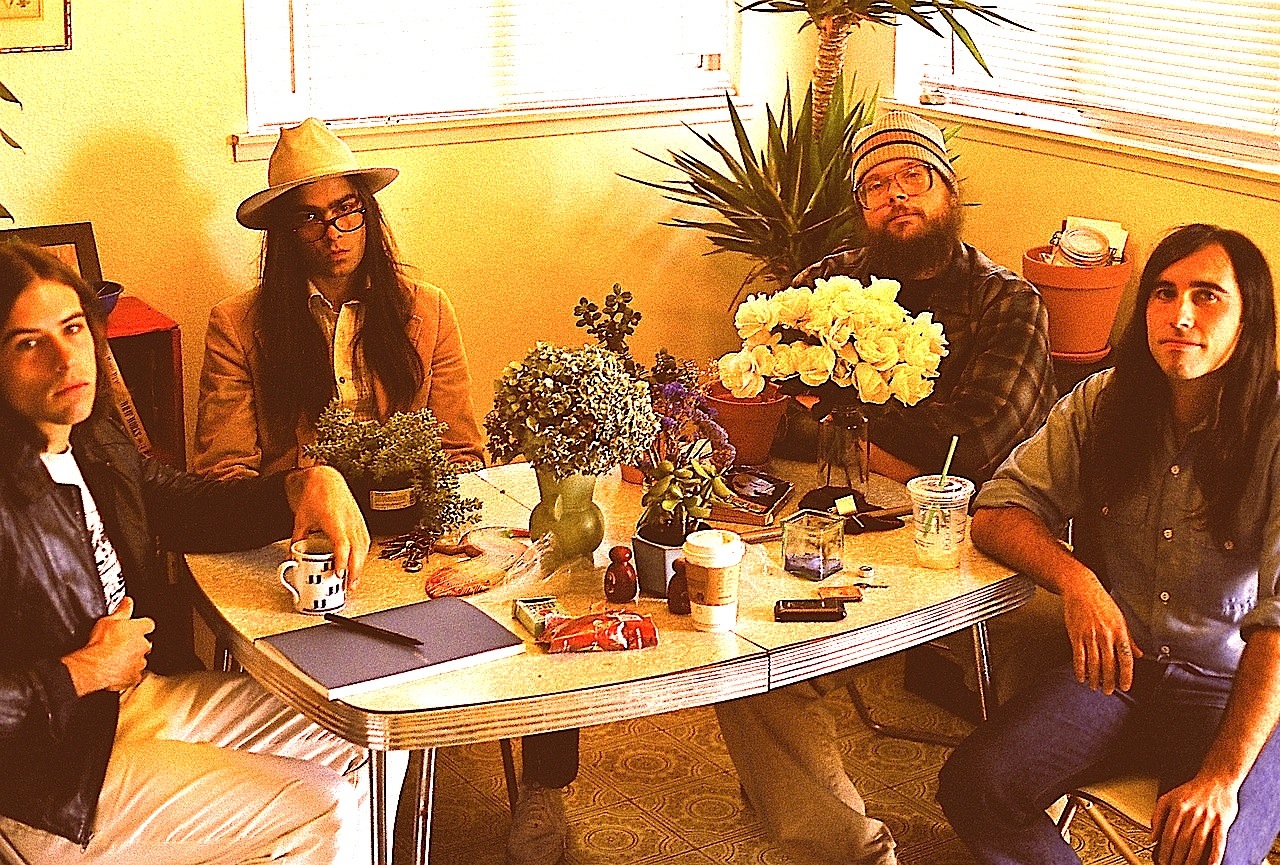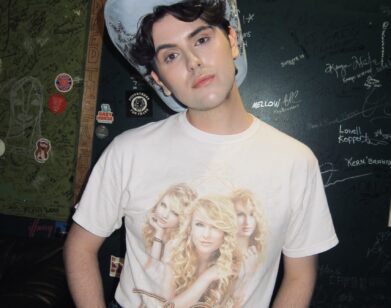Milk Music’s Negative Space

ABOVE: MILK MUSIC
“Welcome to the real fuckin’ world, brother!” howls Milk Music singer Alex Coxen over the smoky, low-down burn of “Cruising with God,” a track from the band’s debut full-length, Cruise Your Illusion (Fat Possum). Released in April, the album meanders along a sonic path of nuanced, homegrown psychedelia, fuzzy stereo-guitar riffs, and badass leads that buttress cathartic, at times disjointed, declarations of frustration and desire.
And though referencing SST bands like Dinosaur Jr. and Hüsker Dü in an attempt to articulate their sound is not unwarranted, Milk Music’s overall vibe is further from the sense of safety those references evoke today—they’re less “art school,” more “skip school.” From the stage at last year’s Pitchfork Music fest in Chicago, Coxen jokingly goaded the audience: “Fuck your parents, kill yourselves, you pussies!”
This past Memorial Day, we spoke with Coxen, bassist Dave Harris, drummer Joe Rutter, and ace guitarist Charles Waring by phone from their new digs in Joshua Tree, California (where they all share living quarters), about their origins in Olympia, WA, the death of the 20th century, UFOs, and what it means to be illegal and free.
DAVID JACK DANIELS: This being Memorial Day, I guess an appropriate place to start would be your song “Illegal and Free.” Even saying the name out loud is empowering. What’s it all about?
ALEX COXEN: It’s not about going out and breaking the law, necessarily, it’s just a way of living and being dangerous. There just doesn’t seem to be much of a counterculture these days. There are a lot of people who appreciate counterculture now, and sell it, and advertise it, and put it out there, but there’s no big thing happening. I’d like to think that with Cruise Your Illusion, the band is a prophecy—it’s propaganda for counterculture, propaganda to be wild. We also just like music a lot and we take it real seriously.
DANIELS: Where you’re from, Olympia, seems to have a long history of a counterculture, ostensibly at least, and a strong underground music scene. Any weird vibes from people who were at your first shows—in someone’s basement or kitchen—now that you’ve gotten some attention and are out touring the world and playing bigger gigs?
CHARLES WARING: Nah, man, it’s not like that.
JOE RUTTER: Everybody’s super supportive of what we’re doing.
DAVE HARRIS: I’m sure there’re a bunch of people talking shit behind our backs. [all laugh] There were always people there who were like that, but that goes back to before there was any hype about the band.
COXEN: Most of that isn’t because of our success, but because of our political mindset.
DANIELS: How would you describe your political mindset?
COXEN: No rules, man. We’re just into this darker thing. We’re all into the planet and nature and stuff, but, speaking for myself, I just feel negativity could be embraced a little more. I mean, I walk around, and sometimes I’d like to see a mushroom cloud fall. I assume there are other people out there who are like that, but they’re afraid to be negative, or they think [being negative] is a bad thing. You have to harness that energy.
We might play a show and shit will be falling apart, and we’ll be angry, and I’ll think, That was a good show. But then somebody will say, “You seemed really angry,” and I’m like, “Well, we were!” And I don’t want to pretend like we’re not [angry], you know? I want to say, “Man, fuck this!” And to me, that’s me giving as much as I can—that’s honestly how I felt at that moment.
DANIELS: I got you.
COXEN: A while back, we saw Ariel Pink in Mexico, and he was great—he’s really negative. [all laugh] The way he was yelling at the sound guy, I felt like he was a hero for us musicians at festivals.
DANIELS: You think people are too sensitive these days?
COXEN: Me being a liberal, and being raised liberal, I feel like I’m constantly being betrayed by my own people—like, what a bunch of pussies! [all laugh] And it’s not like I want to go conservative or anything, but you just realize that some things go beyond politics. Nothing’s dangerous anymore—there’re no lines to cross and everyone’s moving forward. Like, now, your mom’s into Nirvana, you know?
DANIELS: It’s sort of disappointing to realize that that’s not shocking, that someone’s mom likes Nirvana, or whatever. Maybe it’s an age thing, but even beyond that, do you feel like the Internet is to blame? And that, especially through social media, we’ve all, unwittingly or not, become salespeople, trying to sell ourselves or someone else or some product?
WARING: And you’re being fucking monitored, too. Every time you say something on Facebook or whatever … It’s all this Orwellian shit going on now. I keep seeing those British posters, from World War II, that say “Keep Calm, Carry On.” I feel like kids wearing those T-Shirts, it’s like walking around in that movie They Live [1988]. Everyone’s acting a certain way—
COXEN: Everybody’s frontin’. I always look at past decades and wish I could’ve been alive then. You could go to someplace like J.C. Penney and buy a lot of shit that’s cooler [all laugh]—clothing, cars, gear—but all these people I love from past decades, who were freaks or artists or whatever, were always complaining, “Oh, man, I wish an atom bomb would drop and kill all these people.” And that’s the way I feel now. I mean, maybe it’s the same all over, and we’re just straight-up, dictionary-definition counterculture people and that’s all there is to it. We don’t have very much money, and we hate the people around us and all the products they try to sell us, and it’s like, Well, what’s new or radical about that? I just don’t know why there isn’t more of it now. Everybody’s just so friendly and, you know, people don’t go wild at shows as much. But when they do, we’ve had some great shows, it’s just, like, the whole punk thing … I feel there’s this melting pot of ideas in music, different cultures that everybody knows, and since there aren’t those dividing lines anymore, why don’t all people just jump in and just freak out?
DANIELS: So what happened to that counterculture—what’s missing from today?
COXEN: I think the Internet has basically annihilated the 20th century, and I think one of the biggest impacts [on my generation] has been AIDS. Like, the era that AIDS came about in, I think a big demographic of people it killed were a lot of artists and creative minds, and those are minds we need today from that generation, but they’re gone. Also [AIDS] really scared the culture—that wild culture. When AIDS came about, [the ’80s] was a time when America really changed. It was like, “Okay, the 20th century is dead.” And it’s just a shame, because that’s the kind of shit I grew up being into, and it’s the kind of culture I like, and I feel like it’s a part of me—so it’s like, “Oh yeah, this kid was born too late.”
DANIELS: Do you feel your music is a sound track to the hangover of the death of the 20th century—AIDS, the Internet, the post-9/11 Orwellian world?
WARING: I feel like the whole point of art is that the person experiencing it gets to draw whatever kind of conclusions they want, and I don’t know who I am, really, to spoil that with whatever the real, straight dope, is. Al?
COXEN: Well, basically, I wanted to meld the stark energy of punk music with psychedelia—those were my two biggest influences for the sound. It’s more about the energy. We’re just trying to make art, to make expressive music—the kind people can get lost in. And the lyrics are really just half of it. I wouldn’t want to explain it in complete sentences, but there’s a lot of spirituality, a look at the human condition, and a lot of internal stuff in a lot of those songs.
DANIELS: How has Joshua Tree impacted your writing process?
HARRIS: I feel being out here, when we’re not on tour, we’ve been influenced by this isolated lifestyle. We live on this ridge with a panoramic view of mountains, and we just jam and hang out all day.
DANIELS: So, basically, you’re living the dream.
HARRIS: Compared to the Northwest, where you turn your head and there are trees and houses, and you can’t see much of the sky, out here, I can look out the window and see this mountain that sits behind Palm Springs. I feel like the visual space influences the mental space—you can expand and get more far out, out here, because there’s more room for it, and less shit in your visual field.
RUTTER: For the first time ever, us all living together out here, we can just hop on any new ideas and start hacking away at it, and it just feels so fresh—music sounds a lot better when it’s like that.
COXEN: This idea of moving out to the desert, as most good ideas are, was this real dramatic concept—this daydream fantasy of imagining yourself wearing a white robe, jamming in the desert, making an album with that whole vibe, but then when you actually do it, it becomes more like real life and a lot of the fantasy drifts away, but it’s still an extreme change … We’re getting to where we as a band can really, like, ride a moving, living kind of song—being just more living and fluid—it’s a very possessed sound, because I feel we’re all possessed by where we live now. There’re definitely different ideas in the air out here—different ideas flying in the wind. [pause]
WARING: Different ideas flying in the wind? [all laugh]
DANIELS: Speaking of which, I hear Joshua Tree is known for the occasional UFO sighting. Have you spotted any while you’ve been out there?
HARRIS: Not yet. Everyone we talk to has seen some weird stuff, but I’m still waiting for my first paranormal encounter. We live next door to a Marine base, so there’s been some crazy identifiable flying objects, but nothing unknown yet.
WARING: Our neighbor says that we’re all aliens and that’s why we were drawn here. He’s like, “Your ship’s waiting, man! Just start walking! You just have to get up there!”
CRUISE YOUR ILLUSION IS OUT NOW. MILK MUSIC WILL PLAY AT 285 KENT IN WILLIAMSBURG THIS SATURDAY, JUNE 15. FOR MORE ON THE BAND, PLEASE VISIT ITS WEBSITE.






